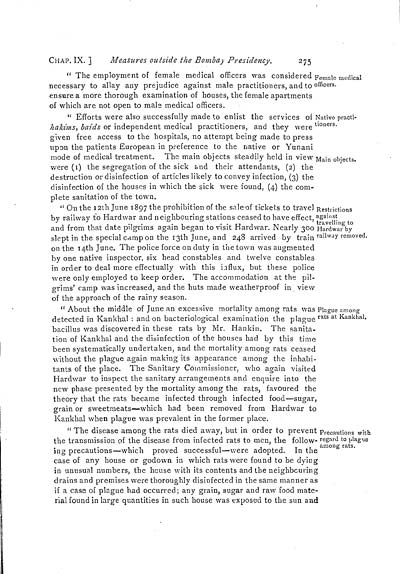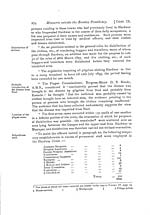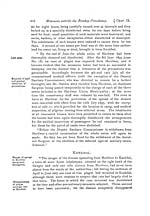Medicine - Disease > Plague in India, 1896, 1897 > Volume 1
(296) Page 275
Download files
Individual page:
Thumbnail gallery: Grid view | List view

CHAP. IX. ] Measures outside the Bombay Presidency. 275
Female medical
officers.
"The employment of female medical officers was considered
necessary to allay any prejudice against male practitioners, and to
ensure a more thorough examination of houses, the female apartments
of which are not open to male medical officers.
Native practi-
tioners.
Main objects.
"Efforts were also successfully made to enlist the services of
hakims, baids or independent medical practitioners, and they were
given free access to the hospitals, no attempt being made to press
upon the patients European in preference to the native or Yunani
mode of medical treatment. The main objects steadily held in view
were (1) the segregation of the sick and their attendants, (2) the
destruction or disinfection of articles likely to convey infection, (3) the
disinfection of the houses in which the sick were found, (4) the com-
plete sanitation of the town.
Restrictions
against
travelling to
Hardwar by
railway removed.
"On the 12th June 1897 the prohibition of the sale of tickets to travel
by railway to Hardwar and neighbouring stations ceased to have effect,
and from that date pilgrims again began to visit Hardwar. Nearly 300
slept in the special camp on the 13th June, and 248 arrived by train
on the 14th June. The police force on duty in the town was augmented
by one native inspector, six head constables and twelve constables
in order to deal more effectually with this influx, but these police
were only employed to keep order. The accommodation at the pil-
grims' camp was increased, and the huts made weatherproof in view
of the approach of the rainy season.
Plague among
rats at Kankhal.
"About the middle of June an excessive mortality among rats was
detected in Kankhal: and on bacteriological examination the plague
bacillus was discovered in these rats by Mr. Hankin. The sanita-
tion of Kankhal and the disinfection of the houses had by this time
been systematically undertaken, and the mortality among rats ceased
without the plague again making its appearance among the inhabi-
tants of the place. The Sanitary Commissioner, who again visited
Hardwar to inspect the sanitary arrangements and enquire into the
new phase presented by the mortality among the rats, favoured the
theory that the rats became infected through infected food-sugar,
grain or sweetmeats-which had been removed from Hardwar to
Kankhal when plague was prevalent in the former place.
Precautions with
regard to plague
among rats.
"The disease among the rats died away, but in order to prevent
the transmission of the disease from infected rats to men, the follow-
ing precautions-which proved successful-were adopted. In the
case of any house or godown in which rats were found to be dying
in unusual numbers, the house with its contents and the neighbouring
drains and premises were thoroughly disinfected in the same manner as
if a case of plague had occurred; any grain, sugar and raw food mate-
rial found in large quantities in such house was exposed to the sun and
Female medical
officers.
"The employment of female medical officers was considered
necessary to allay any prejudice against male practitioners, and to
ensure a more thorough examination of houses, the female apartments
of which are not open to male medical officers.
Native practi-
tioners.
Main objects.
"Efforts were also successfully made to enlist the services of
hakims, baids or independent medical practitioners, and they were
given free access to the hospitals, no attempt being made to press
upon the patients European in preference to the native or Yunani
mode of medical treatment. The main objects steadily held in view
were (1) the segregation of the sick and their attendants, (2) the
destruction or disinfection of articles likely to convey infection, (3) the
disinfection of the houses in which the sick were found, (4) the com-
plete sanitation of the town.
Restrictions
against
travelling to
Hardwar by
railway removed.
"On the 12th June 1897 the prohibition of the sale of tickets to travel
by railway to Hardwar and neighbouring stations ceased to have effect,
and from that date pilgrims again began to visit Hardwar. Nearly 300
slept in the special camp on the 13th June, and 248 arrived by train
on the 14th June. The police force on duty in the town was augmented
by one native inspector, six head constables and twelve constables
in order to deal more effectually with this influx, but these police
were only employed to keep order. The accommodation at the pil-
grims' camp was increased, and the huts made weatherproof in view
of the approach of the rainy season.
Plague among
rats at Kankhal.
"About the middle of June an excessive mortality among rats was
detected in Kankhal: and on bacteriological examination the plague
bacillus was discovered in these rats by Mr. Hankin. The sanita-
tion of Kankhal and the disinfection of the houses had by this time
been systematically undertaken, and the mortality among rats ceased
without the plague again making its appearance among the inhabi-
tants of the place. The Sanitary Commissioner, who again visited
Hardwar to inspect the sanitary arrangements and enquire into the
new phase presented by the mortality among the rats, favoured the
theory that the rats became infected through infected food-sugar,
grain or sweetmeats-which had been removed from Hardwar to
Kankhal when plague was prevalent in the former place.
Precautions with
regard to plague
among rats.
"The disease among the rats died away, but in order to prevent
the transmission of the disease from infected rats to men, the follow-
ing precautions-which proved successful-were adopted. In the
case of any house or godown in which rats were found to be dying
in unusual numbers, the house with its contents and the neighbouring
drains and premises were thoroughly disinfected in the same manner as
if a case of plague had occurred; any grain, sugar and raw food mate-
rial found in large quantities in such house was exposed to the sun and
Set display mode to: Large image | Zoom image | Transcription
Images and transcriptions on this page, including medium image downloads, may be used under the Creative Commons Attribution 4.0 International Licence unless otherwise stated. ![]()
| India Papers > Medicine - Disease > Plague in India, 1896, 1897 > Volume 1 > (296) Page 275 |
|---|
| Permanent URL | https://digital.nls.uk/74594284 |
|---|




